How To Reduce Cost And Waste In A Hotel - Guide For Hotel Owner
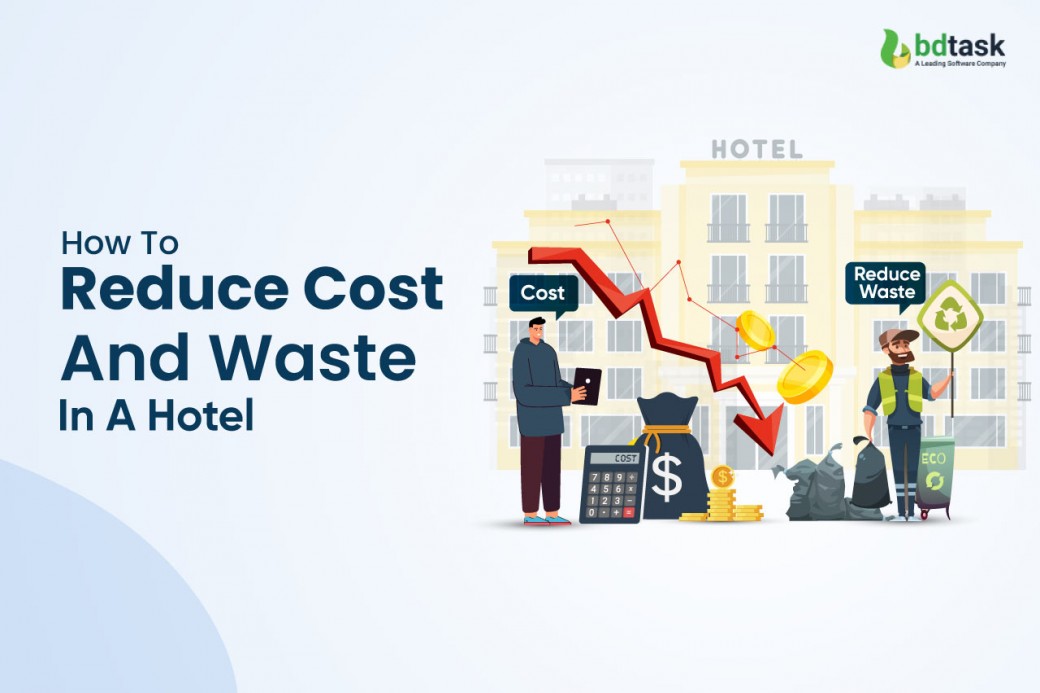
Hotel guest service is the main weapon of all hotel business. But sometimes, hotel maintenance costs get so out of hand in the craziness of fulfilling customer satisfaction levels. But in this tension of guest satisfaction, the biggest concern is how to reduce cost and waste in a hotel.
In short, it takes time for hotel entrepreneurs to achieve the opportunities and expand the business with the available resources.
Indeed, it's a cold truth that not only hotel industries but every other industry are concerned with controlling the business cost.
But for hoteliers, it takes a lot of work to maintain excellent hospitality service while simultaneously reducing hotel costs.
Cost reduction is necessary because it helps hotels with specific profit margins control and stay within the budget. The best possible policy is to plan a "cost reduction strategy" to earn profit while avoiding irrelevant expenses.
Hence, even though hotel business owners pretend that hotel cost or expense control is not their first priority, it's still their ultimate concern.
And that's why my blog is for you. Through my blog, you get some amazing tricks on how to reduce cost in the hotel industry.
Biggest Concern Of Hotel Entrepreneurs
How Can Hotels Save Cost?
Whenever we talk about reducing costs, it automatically directly relates to a business's expense and operational costs.
As a hotel entrepreneur, the more staff you have in your hotel, the more expenses you must bear at the month's end.
In some secondary research, it's been mentioned that 50% of your hotel expenses are spent on hotel staff and workers.
Hence, the only solution to save hotel costs is to set the workers/staff schedule so that no staff becomes underutilized. The best solution would be to divide their duties roaster-wise based on the hotel timeline.
Most hoteliers are concerned about how to reduce cost and waste in a hotel and maintain the hotel customer service together. It is challenging, but if you can do that, you can ensure profitability and financial sustainability. Here are some following steps you can take to reduce cost and waste in the hotel industry:
- Expense identification: Record all the monthly/daily big or small expenses in an organized manner in a hotel management system.
- Set a specific cost target: Set a monthly/daily expense target and try to be within that range.
- Research competitor's expense: Analyze the competitor's expense, in which sector they're wasting more expense.
- Monitor the expense: Closely monitor the hotel cost, whether it's absolutely necessary for the hotel or not.
- Implement the hotel cost appropriately: As a hotelier, you must analyze which sector of your hotel needs investment, where you can save cost, and where you need investment.
Importance Of Cost Control In Hospitality Industry
Of course, controlling the costs in the hospitality industry is essential, but in reality “reducing hotel cost” actually conveys a proper use of hotel expense and operational cost.
The ultimate formula of cost control in the hotel industry is to constantly reduce business expenses and increase profit margin.
But fortunately, there are several methods and techniques for cost control in hospitality industry:
- Hire outsourcing providers: hand-over the task to the outsourcing team to cut down the hotel expense.
- Focus on efficiency: Hoteliers need to focus on hotel guest satisfaction and nurture the hotel facilities as soon as they arrive.
- Bulk buying of hotel supplies: If hoteliers purchase hotel suppliers in bulk, then it’s obvious you can get everything in a better deal.
- Analysis of the bills: check the hotel bills, such as electricity, water, and many more, and check if there are any issues in bill calculation.
How To Reduce Cost And Waste In A Hotel? (Types Of Hotel Cost)
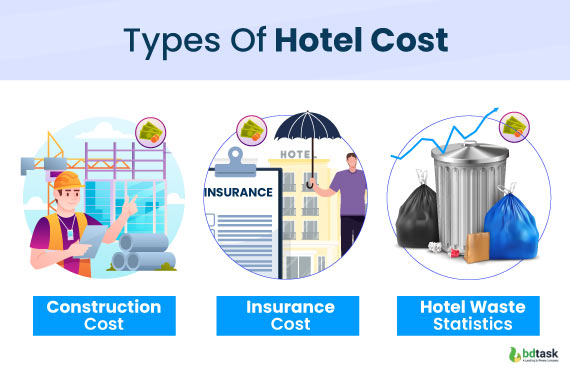
Of course, there are uncountable types of hotel costs. And it’s totally up to the hotel manager what strategy to apply to cut off the cost.
Among these, multiple types of hotel costs are operational costs, different hotel bills, hotel tax, insurance costs, hotel construction costs, hotel maintenance costs, and many more.
And it would be better for the hotel manager if he followed a well-organized hotel management system. Hence, dividing the costs and utilizing the hotel management budget efficiently will be easy.
1. Construction Cost
If you plan on starting a hotel business, this session is one of the crucial ones for you. Hotel construction costs encompasses multiple types of costs, such as;
- land acquisition
- architectural design
- building permits
- Construction materials
- Interior design
- Location section
- Government cost (VAT and tax)
Moreover, for a hotelier, there are many costs apart from setting structure, for instance, the cost involved in creating the environment, marketing costs spent in establishing the hotel brand, luxury items to decorate the hotel, and many more.
2. Insurance Cost
Hotel insurance cost is another cost that most hoteliers are concerned with. It's the hoteliers' paramount duty to take care of all the assets of the hotels, such as assets, hotel desk officers, servers, and guests.
Besides, hotel insurance cost covers a crucial part of hotel asset insurance, for example:
- Property Insurance
- Liability Insurance
- Workers' Compensation
- Business Interruption Insurance
Hotel insurance cost basically applies to safeguard the hotel's physical and visual property from potential risks, earthquakes, guest-related accidents, and any other unavoidable unfortunate situation.
3. Hotel Waste Statistics
The World Travel & Tourism Council (WTTC) predicts that the travel and tourism industry may reach more than 9.5 trillion globally in 2023.
However, this percentage also suggests not only the growth of the hotel industry but also that the percentage of waste is increasing daily.
A secondary research, “Advanced Hospitality Technology,” mentioned that hotel industries create CO2 emissions equal to 19 volcanic eruptions. Every year, hoteliers create 1.9 Billion lbs of waste and also use 219 billion gallons of water. Every hotelier should maintain a hotel waste management plan, so that you can exit all the waste before it takes any intolerable smell.
Of course, different types of waste significantly impact the hotel cost.
Different Types Of Waste In Hotel Industry:
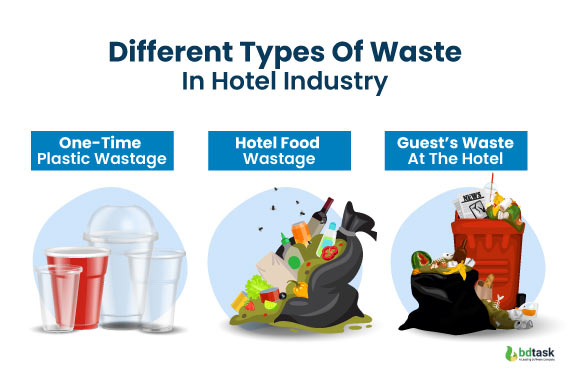
- One-Time Plastic Wastage
Indeed, hoteliers generate tons of one-time plastic waste (water bottles, toiletries, containers, snack wrappers, etc.). Some get naturally decomposed, and some end up filling the lands.
- Hotel Food Wastage
Every hotel has an in-house restaurant to facilitate guests at any hour. Hotel restaurants, such as room service, bar food, and fine dining restaurants, can be any type. Hence, a massive amount of food waste happens, and as a result, it causes a significant amount of environmental damage.
- Guest’s Waste At The Hotel
Controlling guest waste is a major issue to tackle for every hotel entrepreneur. And the best way to tackle this waste is to use a proper recycling system in every hotel.
- Guest Waste Includes:
- Food Scraps
- Food Containers
- Napkins
- Tea Bags
- Coffee Grounds
- Fruits
- Vegetables
- Plastic Bottles Or Containers
- Paper Towels
- Tissues
- Different Paper Products
- Shampoo Bottles
- Personal Hygiene Items
4. Hotel Operating Cost
Usually, the hotel operating budget is allocated for running the hotel functions smoothly while ensuring the hotel's guest satisfaction. Here are some multiple types of operating costs in the hotel industries:
- Labor Cost: (Salaries, Benefits, Training, Recruitment Expenses, Front Desk Staff, Housekeeping, Hotel Management Team)
- Utility Bills: (Electricity, Water, Heating, And Cooling)
- Internet, Phone, And Television
- Hotel Management Software (booking system, room reservation system, accounting system, room orientation, inventory management, food management)
- Housekeeping Suppliers (Cleaning Agents, Fresh Linens, Toiletry, Hotel Laundry Costs)
- Hotel Marketing Cost
- Hotel Maintenance And Repair (in-room entertainment systems, mini-bar restocking)
- Property Taxes
- Guest Amenities (Room Service, Complimentary Breakfast, Minibar, Swimming Pool, Hair Dryer, Towel, Wi-Fi, Parking, Slippers)
- Food & Beverage Supplies
To sum up, an effective use of operating costs assists in maintaining the year-end hotel budget.
How To Reduce Cost And Waste In A Hotel-10 Top Strategies
This blog section will be all about the best cost-saving ideas for hotels. Indeed, a hotel manager should be well aware of all the expenses, operations, and other related costs. There is a significant need for an efficient hotel management system and hotel booking software to manage, track, and control all the express.
A hotel manager must manage every cost and efficiently utilize expenses at full capacity. As a result, it would be easy to run the hotel business more smoothly. Here are the top strategies to reduce cost and waste in a hotel:
1. Integrate A Cloud Based Property Management System
A cloud-based PMS helps to automate the hotel IT system, which saves a lot of time and cost.
2. Efficiently Integrate With Different Hotel Booking Engines
Through integrating with different hotel booking engines, hotel entrepreneurs can easily increase booking, less dependency on online travel agents (OTA), booking through hotel websites, and provide different promotional offers to the hotel guests.
3. Flexible Working Hours For Hotel Staff
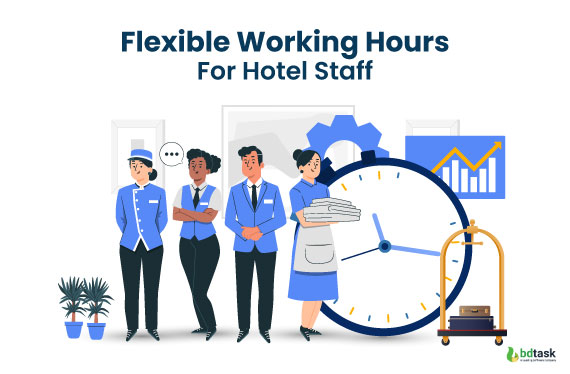
It's better if the hotel manager systemises the hotel staff duties and provides a roaster duty schedule. As a result, hotel staff will be energized and can give better dedication to the task. Hence, hotel managers can fully utilize the hotel staff and, at the same time, be overstaffed or understaffed.
4. Hire As Many Workers As You Need In Hotel
Make sure you hire as many hotel staff as you need to run a hotel operation smoothly. As a hotel manager, you must ensure that all your staff are perfectly used and doing their appointed task properly.
Types of hotel staff:
- Assistant Hotel Manager
- Hotel Manager
- Supply Chain Manager
- Marketing & It Head
- Housekeeping
- Night Officer
- Hotel Front Door Man
- Hotel Receptionist
5. Spent Less In Hotel's Marketing Cost
Indeed, it's true that hotel promotion strategies require a lot of money to get better reach and more bookings. If you are really low in budget, it's better to apply digital marketing.
Also, with paid promotion, you might get less than 100% of your reach, but with digital marketing. Create different social media (Facebook, Instagram, & SEO), and post great content without spending money.
6. Use Energy-Efficient Technologies
As a hotel entrepreneur, you always need to be environment-friendly and use energy-efficient technologies in the hotel.
By using energy-efficient technology, you not only can save the environment but also benefit your hotel.
You can use occupancy-sensitive cooling, heating systems, power-saving lights (LEDs), motion sensor lights, reusable glasses, etc.
7. Separate Budget For The Food And Beverages Department
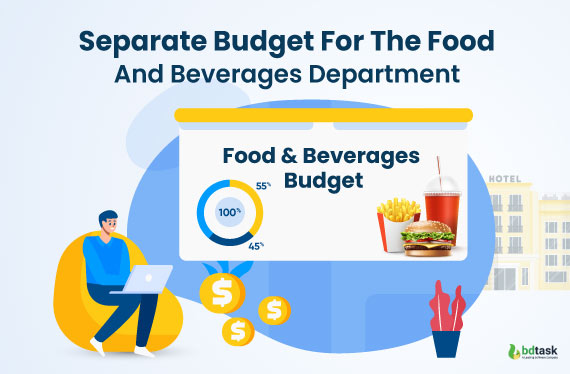
As a hotel entrepreneur, it's better if you prefer quality over quantity because that's how you can touch the satisfaction level of your customers.
And understanding how much food is transformed into finished goods is also a notable point for you.
As a hotel manager, you need to analyze the number of food & beverage items that are selling the most and which are coming back with leftovers. And if you can find a good measurement, you can really cut down the cost from this sector.
8. Try To Save On Interior And Furniture

It often happens with all hotel owners that the more you do the aesthetic interior, the more customers will be attracted to your hotel. Saving on interior design and furniture in a hotel is possible without compromising on quality and guest comfort. You can cost-save on interior and furniture if you follow some tips for your hotel:
- Consider Pre-Owned Furniture
- Prioritize Functionality and Durability
- Local Sourcing
- Minimalist Design
- Bulk Purchasing
- Online Marketplaces and Auctions
9. Proper Utilisation Of Hotel Space
Proper utilization of hotel space is essential for maximizing revenue, enhancing guest experiences, and maintaining operational efficiency.
You can do some space planning with architects and interior designers to create a functional layout that optimizes the use of space while ensuring a pleasant ambiance.
By carefully planning, adapting, and managing hotel space, you can create a more profitable and enjoyable experience for both guests and staff.
10. Auditorium To Host Events And Programs
Designing an auditorium in a hotel to host events and programs requires careful planning and consideration of various factors to ensure it meets the needs of guests.
As a hotel manager, you must remember the hotel's auditorium to be versatile, well-equipped, and comfortable. You can attract a wide range of events and programs. Thereby increasing revenue and enhancing the overall guest experience at your hotel.
Lastly, how to reduce cost and waste in a hotel is not only about saving environmental responsibility but also financially beneficial. By carefully managing resources, optimizing operations, and fostering a culture of sustainability, hotels can significantly reduce their costs while minimizing their impact on the environment.
From energy-efficient technologies to waste reduction programs and staff training, the path to sustainability offers numerous opportunities for hotels to thrive in a more eco-conscious world.











